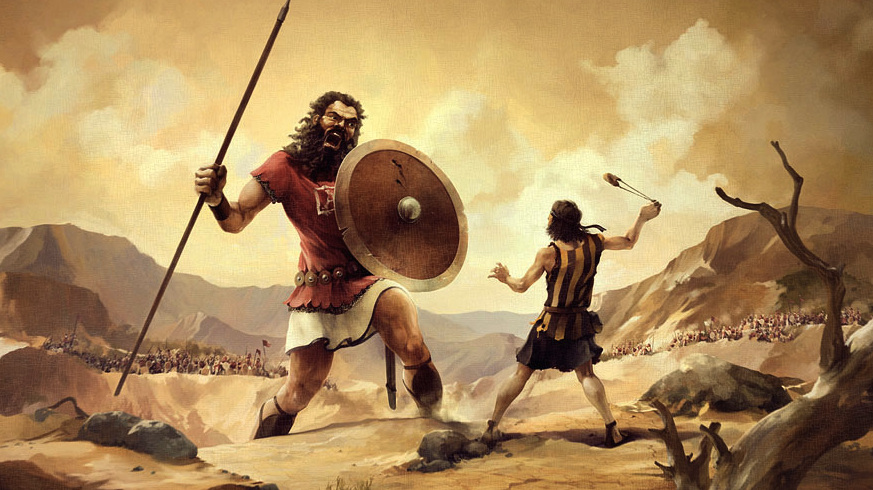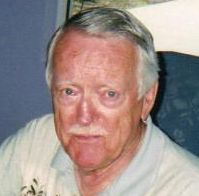The Goliath Fallacy… jousting with the overdogs
 Richard III was King of England, and there he had the advantage over me. But he was a hunchback, and there I have the advantage over him.
Richard III was King of England, and there he had the advantage over me. But he was a hunchback, and there I have the advantage over him.
- Mark Twain
William Annett Global News Centre
(DAYTONA BEACH) In his best-seller, “David and Goliath: Underdogs, Misfits and the Art of Battling Giants,” Malcolm Gladwell covers the subject - and the frequent success - of ordinary people who tilt at extraordinary opponents or forces. In other words, instances where a disadvantage become an advantage. Gladwell’s point is that it happens quite frequently and we don’t realize it. You want to argue? Gladwell’s day job is as a staff writer for the New Yorker, which gives him a distinct advantage right there.
The David and Goliath story is his lead-off prima facie case. Traditionally, we view Goliath as a huge giant of a man, an accomplished warrior armed to the teeth with sword, spear, armor and probably a wrought iron jock strap. The only guy in the crowd willing to take him on is David, a 97-pound weakling, like Charles Atlas getting sand kicked into his face before he saw the light, a shepherd boy, literally in shorts and tee shirt, like an undiscovered and under-rated Mark Zuckerberg, nary a bit of armament but a sling shot with which he occasionally annoys the sheep, using them for target practice, in addition to the usual mauvais hanky panky we’ve all heard endlessly about shepherds and their flocks.
You’re inclined to lay at least eight-to-five on Fatso, right? Not so fast, says Gladwell. If there had been endocrinologists in those days, they could have told you by just looking at him that Goliath was not only down a quart mentally, but he had an overactive pituitary gland, accounting for his cumbersome size and unmanageable weight, and his dim-bulb occipital lobe limited his vision, enabling him to do nothing but close-range scuffling with nothing but his stupid broadsword, which was about three feet long.
On the other hand, the sling that David possessed was a strategic weapon with which his constant sheep-shooting had honed his marksmanship to a deadly accuracy at a distance, while the rock he chose - about the size of a Titleist golf ball - represented a lethal missile. Altogether, the AK-47 of his time.
Clear? Crystal, as Jack Nicholson would say. “Asymmetrical conflicts,” according to Gladwell, are interesting because not infrequently there’s a reason why little guys whip big guys, making us all feel warm and fuzzy, and not only because little guys are good like Popeye and big guys are bad like Bluto.
When I was laboring as a penniless stock broker, I had two friends, Jimmy and Dick, with whom well nigh every day after the market closed I would repair to a nearby estaminet. Dick was 6’2″ and well-built, Jimmy was maybe 5’7″ and well-intentioned. At least, he loved Dick like a brother. Except that he had a subconscious paranoid aversion to big guys, (a Davidian complex, if you will) which only emerged when he was alcoholically challenged. Accordingly, after three drinks, Jimmy would look around the bar for the biggest guy in attendance. It was usually Dick. So he would begin to needle Dick to the point where Dick (who loved Jimmy like a brother) would lean across the table and pop Jimmy with a short left jab, put him over his shoulder and take him home.
Dick and Jimmy are an oversimplification of – and perhaps an exception to - - Gladwell’s thesis that in cases of asymmetrical conflict, our assumptions are unreliable concerning disadvantages in a world of advantage.
Try this one. In a past life when I was chasing dollars instead of more conventionally, women, I had an occasion to interview Edgar Kaiser, one of the most successful entrepreneurs I’ve encountered. (His father built Liberty ships and automobiles, but Edgar went far beyond that in several industries.) And Edgar was dyslexic.
Gladwell has that one covered too. It appears that dyslexia, far from being a disadvantage or handicap, has a particularly useful application to corporate thinking. “We see so many entrepreneurs that have dyslexia,” says Gladwell. “When you talk to them they tell you that they succeeded not in spite of their disability but because of it… That suggests that the distribution of responses to an obstacle are profoundly bimodal. We pretend that they are not.”
And then there’s the old chestnut of “deprived childhood,” or children deprived of one or more parents at a tender age. According to Gladwell, concerning not a few of such children - certainly not a majority - “a parental loss appears to be, ultimately, a desired difficulty.”
I offer the flip side: my father put me and my brothers through university. I worked in the summers but, according to his mandate, the dough went in the bank. Because of this desired advantage, I didn’t have a clue about money or its husbandry till I was 40 years old. (And damned little since, actually, although I’ve spent my life laboring in the financial vineyards.)
And speaking of desired difficulties, what of the curse of manic depression? A split vote, here. Winston Churchill, one of our boys and a classic bi-polar when we needed him most, declared that the line between great achievements and abject failure was as thin as a razor’s edge. Ernest Hemingway, who was also as bi-polar as Admiral Perry, climbed a lot of literary Kilimanjaros, before he blew his brains out in Ketchum, Idaho. On balance, Poppa would probably have concluded that his disorder was a desired difficulty. I kind of finger that possibility myself - I think I’d settle for an ignominious final curtain if I could have written For Whom The Bell Tolls, or even The Old Man And The Sea.
But I maunder. Our subject was the advantage of disadvantage, or perhaps the misperception thereof. My late and inadequately lamented brother Jack was born with such lousy eyesight that he had virtually no depth perception, which is the miracle of binocular vision that we take for granted. In Jack’s cramped little world, like Aldous Huxley, he explored all by himself the art of seeing. And developed his own capability of somehow adapting two-dimensional visualizing to a perception of linear and spacial relationships with which to compensate. I don’t pretend to understand that, but as a result, he became an outstanding architect, with a gold medal from the Royal Architectural Institute of Canada, an Honorable Mention in the famous Toronto City Hall design competition in the Fifties and, after practising in New York, ultimately became vice-president of a creative firm that built much of L.A.’s skyline.
And since I’ve become hopelessly nepotistic, I choose to conclude with the case of my son, Reverend Kevin Annett, B.A., M.A., M. Div (also veteran of a soupcon of Law School, until he recoiled from the prospect of being a lawyer in today’s society). He also earned a Ph. D. that was denied him by a university whose trustees were offended (and implicated) by his subject matter, as I will shortly explain.
Put the case that a church minister in a small Vancouver Island community decides to blow the whistle on criminal activity extending over a century among all the Churches of Canada, cheek by jowl with the Government of Canada, the RCMP, the Attorney General of British Columbia, MacMillan Bloedel, the largest forestry company in that Province and it’s blushing parent, The Weyerhaeuser Company of Seattle, all complicit in a clutch of different ways too numerous to mention, but having this in common that it would be nice if Reverend Kevin Annett were quietly blown away. Which they did, unconventionally but quite effectively.
Sounds like a dandy case of Dave-boy and those Goliathan big guys, right?
Oh, I forgot to mention the mainstream Canadian media, which initially gave the whole Canadian genocide issue thereto appertaining a little ink until that brief news cycle was forced off the pages by the Millenium glitch and has been largely manque ever since. And, finally, the Canadian public, who have been as usual fast asleep on the subject of anything indigenous or genocidal for the past 20 years since Kev first blew the whistle.
Come on, Gladwell, give me a leg up here. Well, I suppose the expert on advantageous disadvantage would say that if you think all those institutions are omnipotent, you’d have to point out that there’s nothing dumber than a federal government that has been headed up by such luminaries as John Diefenbaker, Joe Clark, Jean Chretien (who was anglophobically challenged) and latterly and most convincingly by Stephen Harper, whose landmark achievement is that he is currently moving to abolish the Indian Act, and as a short-cut, what’s left of the Indians themselves along with it.
As for the dumber than dumb churches, corporations and the Musical Riders, their actions daily bespeak all the volume of their cretinism that is necessary.
On the other hand, you have this little Reverend but defrocked shepherd boy who has the most lethal, long range, accurate weapon on earth, in addition to being my son. The Truth.
And, jesting Pilate to the contrary, we don’t need Malcolm Gladwell to tell us what Truth is. Especially when it hits us in the middle of the forehead
__________________________________

Bill Annett grew up a writing brat; his father, Ross Annett, at a time when Scott Fitzgerald and P.G. Wodehouse were regular contributors, wrote the longest series of short stories in the Saturday Evening Post’s history, with the sole exception of the unsinkable Tugboat Annie.
At 18, Bill’s first short story was included in the anthology “Canadian Short Stories.” Alarmed, his father enrolled Bill in law school in Manitoba to ensure his going straight. For a time, it worked, although Bill did an arabesque into an English major, followed, logically, by corporation finance, investment banking and business administration at NYU and the Wharton School. He added G.I. education in the Army’s CID at Fort Dix, New Jersey during the Korean altercation.
He also contributed to The American Banker and Venture in New York, INC. in Boston, the International Mining Journal in London, Hong Kong Business, Financial Times and Financial Post in Toronto.
Bill has written six books, including a page-turner on mutual funds, a send-up on the securities industry, three corporate histories and a novel, the latter no doubt inspired by his current occupation in Daytona Beach as a law-abiding beach comber.
You can write to Bill Annett at this address: [email protected]


















 London
London
 Oregon
Oregon





Leave a Reply
You must be logged in to post a comment.